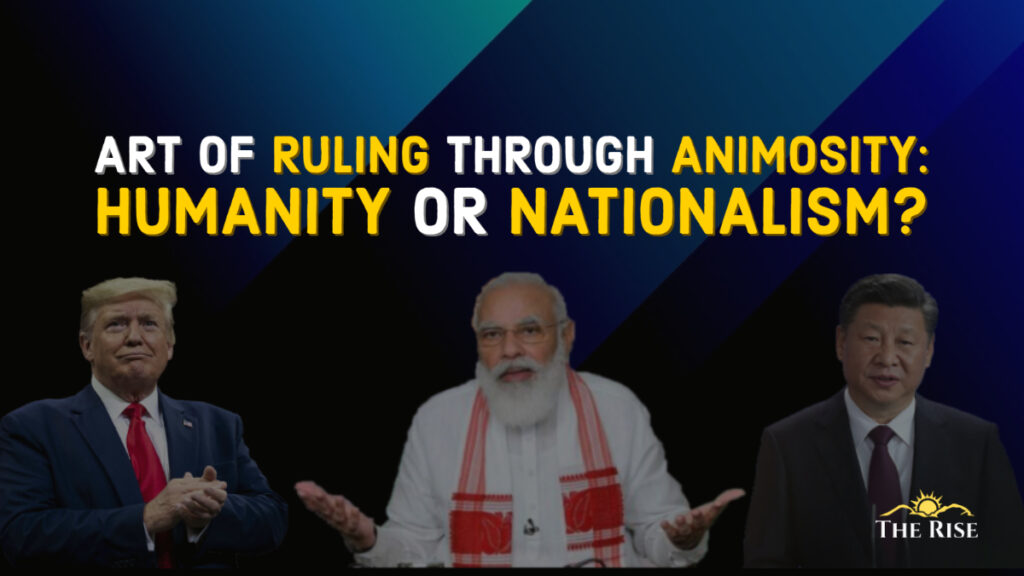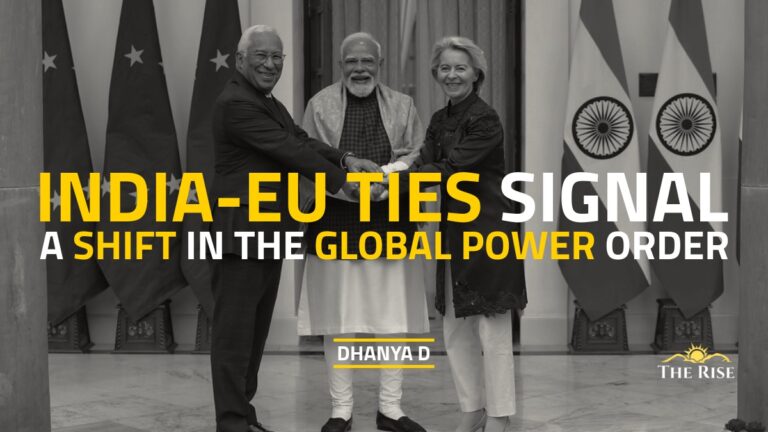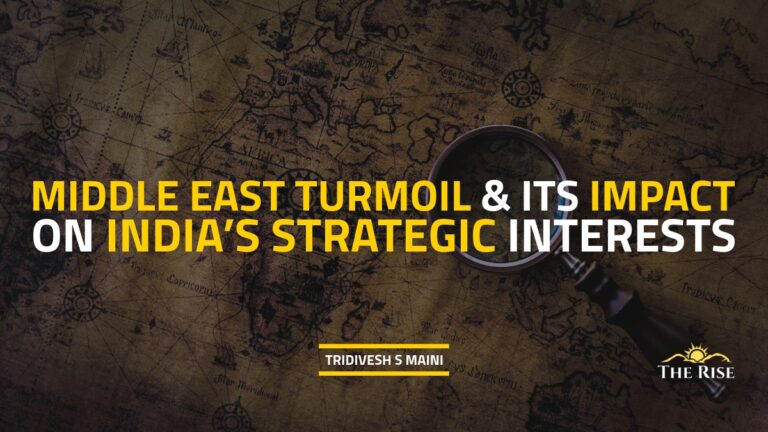The need of the hour is to fight the global pandemic through solidarity and cooperation with each other and putting the historically unresolved issue on the back burner for now. A society comprising of the well-aware citizens with a clear objective of their interest can very easily put this message into the ears of those in the corridors of power!
In Book Five of ‘Politics’, 4th-century philosopher and Alexander’s teacher, Aristotle wrote, “The ruler who has care of the state should invent terrors, and bring distant dangers near, in order so that citizens will be on their guard, and like sentinels in a night watch, never relax their attention”. It was an antidote to prevent revolution and maintain ruling elite control over the state. Almost two and a half millennials later, leaders across the globe are using it to the maxim to strengthen their position.
Last year, when the Indian economy was going through free fall and there was resentment in youth due to increased unemployment, the controversial Citizenship Amendment Act (CAA) was enacted to divert attention from the brewing economic disaster, which in turn ignited communal tension. The strained relationship with our most reliable neighbour Bangladesh and Afghanistan was the fallout of this reckless domestic policy.
Fast forward to the 2020 COVID-19 era, US President Donald Trump, who was quite dismissive of COVID-19 earlier, started targeting WHO and China when positive cases started mounting and his poll numbers began tumbling down. From using racist slur like “China Virus’ to cutting WHO funds, and ultimately withdrawing from its membership, Mr. Trump has tried every arrow in his quiver to divert public attention from his abject failure in handling this pandemic.
It works to the advantage of the ruling elite when people decide with passion rather than reason. Hence, nationalism has emerged as an important tool to achieve that.
The Aristotle proposition can also be applied to China. Various geopolitical commentators have attributed the increasing Chinese assertiveness at most of its borders, including South China Sea, Hongkong, Taiwan, Ladakh, to the emerging public resentment in mainland China against the COVID-19 pandemic as well as the animosity within Communist Party of China against the absolute power of Mr. Xi Jinping. The ongoing Indo-China faceoff at LAC can also be viewed in a similar context.
Closer home, with the increasing internal feud in the Nepal Communist Party, Prime Minister KP Oli got an opportunity to stoke Nepalese nationalism against the Lipulekh pass road opening by India. He utilised this opportunity quite deftly to further his personal interest at the cost of the Indo-Nepal friendship. The primary reason for such a decision is to change the narrative in domestic politics.
Also Read: The tyranny of an independent nation
It works to the advantage of the ruling elite when people decide with passion rather than reason. Hence, nationalism has emerged as an important tool to achieve that. The usage of Pakistan as an enemy in the Indian national debates by many politicians helps them polish their politics. In fact, Pakistan is the best friend of these politicians who gain by demonising it even in State Assembly Elections, as was seen in Delhi 2020 Assembly Elections. The best way to hide the governance failures in handling the pandemic, economy, and ironically even the national borders, is to use the Common Enemy – the Pakistan Card.
The weakening of democratic ethos in the nation is another casualty of such action by regimes as it leads to an authoritarian character where questions raised against the government are termed as ‘anti-national‘.
Souring diplomatic relationship is the first result when nations practise the policy of domestic populism through international arrogance. Old wounds, like border settlement issues, are re-ignited along with new frontiers like an accusation of economic exploitation and interference in the internal matter. Confidence-building measures and institutions enabling them have been established through years of hard negotiations. However, such efforts are easily put on the shelves when populist leader’s rhetoric speeches occupy centre-stage.
You May Like: Democracy 2020: Are new ‘gods’ in the making?
Such rhetorics also make it further difficult for the future regime to settle disputes, like in the case of Nepal which has inserted the new map, including the disputed Kalapani territory, into its constitution. Similarly, the agreement signed with China in 1993, 1996 and 2013 to maintain peace and tranquillity on the border will be harder to follow because of the trust deficit which has been created due to the recent one-sided PLA action on LAC.
Such hyper-nationalist atmospheres even lead to the fourth pillar – media – ignoring the issues of a common man and, instead, focussing on irrelevant issues.
The weakening of democratic ethos in the nation is another casualty of such action by regimes as it leads to an authoritarian character where questions raised against the government are termed as ‘anti-national‘. Governments also impose several sanctions on the citizen and limit their rights on the pretext of national security. It is often observed that the military assumes a central role in public discourse in such conditions.
The development issues of the citizen are put on the back burner with people expected to follow ‘macro-polity’, ignoring the more prominent issues concerning their lives like health, education, infrastructure, jobs, and economy. These issues become secondary to the nationalistic narrative created by populist leaders during the public discourse.
Such hyper-nationalist atmospheres even lead to the fourth pillar – media – ignoring the issues of a common man and, instead, focussing on irrelevant issues. The under-investigation TRP scam by few Indian media houses shows how the issues of a common man are sidelined to divert the public discourse from the government failures.
You May Like: The Descent of Indian Media
The need of the hour is to fight the global pandemic through solidarity and cooperation with each other and putting the historically unresolved issue on the back burner for now.
Amid all this policy shift there is one silver lining – citizens putting more emphasis on their immediate concern as well as cordial relation with other nations. This was evident from neglecting hyper-nationalist agendas in March 2020 Delhi Assembly elections, and Assembly elections of Haryana, Rajasthan. Even at a global level, the win of Moon Jae-in South Korea despite his overture towards North Korea and the setback received by Benjamin Netanyahu’s despite taking a hardened position against Palestine points towards the limitations of aggressive posturing and its domestic benefit.
Also Read: Poetry as a Tool of Dissent in Modern-Day Authoritarian Regimes
The need of the hour is to fight the global pandemic through solidarity and cooperation with each other and putting the historically unresolved issue on the back burner for now. Military adventurism should be seen as a failure of diplomacy instead of national glorification. It is a fact that in a democracy people’s concerns can’t be de-hyphenated from foreign decisions, but, cooperation and interdependence instead of artificially created enmity among nations, should be the basis of this hyphenation.
A society comprising of the well-aware citizens with a clear objective of their interest can very easily put this message into the ears of those in the corridors of power!
Disclaimer: The views expressed in this article are of the author solely. TheRise.co.in neither endorses nor is responsible for them.
About the author
Rajnish Kumar is a graduate in Computer Science Engineering and closely follows the evolving Geo-political scenarios and international relations.








Pingback: Bihar Elections 2020: Anti-incumbency or Pro-incumbency? - TheRise.co.in
Pingback: Rolling the Dice of Democracy through Protests - TheRise.co.in
Pingback: Upholding Civil Liberties in the 21st Century India - TheRise.co.in
Pingback: BJP Juggernaut Halted in 2021 in Bengal, Kerala, TN - TheRise.co.in
Pingback: Course Correction Needed in Election Engine of BJP? - TheRise.co.in
Pingback: Statecraft in Politics Without Frontiers - TheRise.co.in
Pingback: Reinventing Resilience in Tough Times - TheRise.co.in